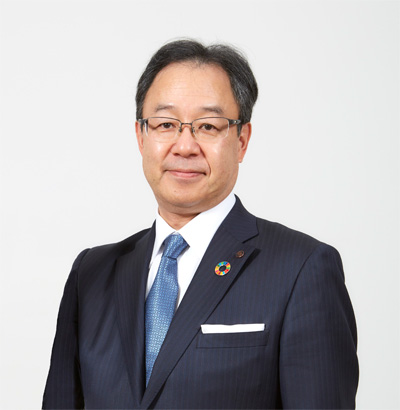
Furukawa Electric Group establishes policies and issues as the “Health Management Guidelines” every year, which focus on health management including work environment management and work management. Based on these guidelines, we promote hygiene management activities across our works and group companies.
Furukawa Electric Group has established the “Furukawa Electric Group Occupational Health and Safety Committee,” chaired by the President, as the highest authority for safety and health management. This committee deliberates and decides on policies and measures for safety and health activities and conducts follow-up.
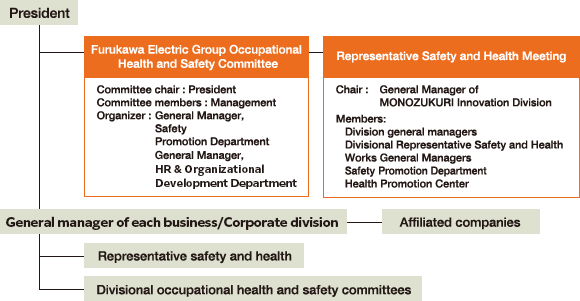
At the Company, we have formed the “Collaborative Health Promotion Team” in collaboration with the Furukawa Electric Health Insurance Society. We hold regular meetings to discuss coordination between the Company’s health promotion activities and the health insurance society’s programs, as well as meetings to incorporate the opinions of occupational physicians and nurses. In addition, in collaboration with the “Health Events” business of the Furukawa Electric Health Insurance Society, each Furukawa Electric corporate works and branch office implements various innovative health promotion activities.
Furukawa Electric Health Insurance Society(only available in Japanese)![]()
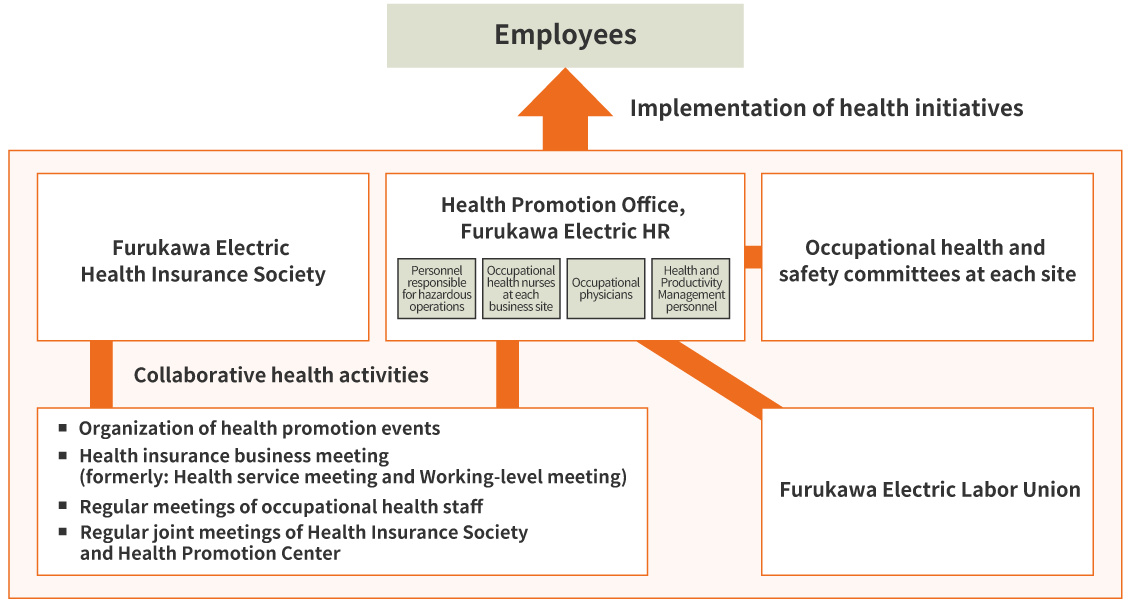
<"Health Events" of the Furukawa Electric Health Insurance Society>
<Efforts at each Furukawa Electric corporate site>
For Furukawa Electric’s greetings, we say "Go-Kenko-Ni!" (stay healthy) along with the manufacturing industry’s beloved greetings, "Go-Anzen-Ni!" (stay safe) among employees to raise each employee’s awareness of health.
In “Five-Year Medium-term Plan for Occupational Health ” toward 2025, the Company promotes health promotion activities based on the five pillars of improving employees’ health literacy, maintenance and improvement of physical functions, mental health, metabolic syndrome, and smoking cessation, aiming to realize “a company where everyone works vigorously, keeps growing and is proud.“ Additionally, we have developed a Health and Productivity Management Strategy Map to clarify the connections between challenges targeted for resolution through Health and Productivity Management and various initiatives, including these five pillars, to enhance the effectiveness of our efforts.
For over 30 years, the Company has collected statistics on employees’ health conditions and compiled them in the “Annual Hygiene Management Report.” Since FY2019, we have produced the “Furukawa Electric Health White Paper,” incorporating information shared with the Furukawa Electric Health Insurance Society, to communicate our health policies and status to internal and external stakeholders, support the promotion of Health and Productivity Management initiatives, and enhance employees’ health promotion activities.
To evaluate and analyze work performance, we use the WFun (Work Functioning Impairment Scale)* to calculate the percentage of employees with a score of 21 or higher (indicating moderate or higher work functioning impairment) as a presenteeism indicator. For absenteeism, we calculate the number of days of long-term absence due to illness per employee. Additionally, work engagement is measured using ultra-short 3-item version of the Utrecht Work Engagement Scale.
* WFun (Work Functioning Impairment Scale): A survey developed by the University of Occupational and Environmental Health, Japan, to measure the degree of work functioning impairment due to health issues.
| Unit | Scope | FY2020 | FY2021 | FY2022 | FY2023 | FY2024 | |
|---|---|---|---|---|---|---|---|
| Percentage of employees with moderate or higher work functioning impairment due to health issues (21 points or above) |
% | Furukawa Electric | 24.5 | 23.3 | 21.0 | 19.6 | 16.9 |
| Unit | Scope | FY2020 | FY2021 | FY2022 | FY2023 | FY2024 | |
|---|---|---|---|---|---|---|---|
| Number of days of long-term absence due to illness per employee* | Days | Furukawa Electric | 3.1 | 3.0 | 3.2 | 3.6 | 4.4 |
* In FY2024, the calculation method was revised, and figures were recalculated retroactively from FY2020, with some notations revised.
| Unit | Scope | FY2020 | FY2021 | FY2022 | FY2023 | FY2024 | |
|---|---|---|---|---|---|---|---|
| Ultra-short, 3-item version of the Utrecht Work Engagement Scale* | Points | Furukawa Electric | 3.1 | 3.0 | 3.0 | 3.0 | 2.8 |
* In FY2024, the calculation method was revised, and figures were recalculated retroactively from FY2020, with some notations revised.
Since FY2018, the Company has implemented the “Health Declaration Short Message” initiative, where all employees, including the President, declare actions to promote their own health in the workplace to enhance health consciousness and health promotion.
In accordance with the Guidelines issued by the Labor Standards Bureau, the Ministry of Health, Labour and Welfare, entitled “Measures to be taken by employers to prevent health impairment due to overwork”, we strive to manage the health of employees who work long hours by implementing strict limitations on working hours based on the health checkup results and by arranging consultations for such workers with occupational physicians.
Since FY2002, the Company has implemented mental health measures, introducing an external EAP (Employee Assistance Program) counseling system. We conduct various mental health education programs, including line care and self-care training. Additionally, following legal amendments, we introduced a stress check system in FY2016, along with consultations with physicians.
| Unit | Scope | FY2020 | FY2021 | FY2022 | FY2023 | FY2024 | |
|---|---|---|---|---|---|---|---|
| Participation rate | % | Furukawa Electric | 97.3 | 97.0 | 96.1 | 96.2 | 97.2 |
Since FY2003, the Company has actively addressed smoking issues, implementing activities to prevent passive smoking and promote smoking cessation. In FY2017, we achieved a no-smoking policy during work hours, and in FY2020, we achieved a complete no-smoking policy on company premises.
The smoking rate among employees has continued to decline from 48.2% in FY2003 to 18.6% in FY2024. Smoking cessation contributes to improving lifestyle habits, and we will continue to support smokers through employee education and smoking cessation counseling by occupational physicians.
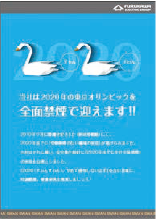
| Unit | Scope | FY2020 | FY2021 | FY2022 | FY2023 | FY2024 | |
|---|---|---|---|---|---|---|---|
| Smoking rate | % | Furukawa Electric | 20.2 | 20.3 | 19.7 | 19.2 | 18.6 |
Falling accidents increase with age. As the workforce ages, concerns about rising falling accidents (including commuting accidents while walking) have prompted the Company to implement fall prevention education and exercise programs (strength training) since FY2016.
To facilitate early detection of sleep apnea syndrome, we have introduced simple testing. Additionally, we hold seminars on achieving better sleep at various sites. Since FY2024, we have enhanced support for sleep improvement by conducting individual consultations with occupational physicians specializing in sleep for high-risk individuals.
For overseas business trips and assignments, Furukawa Electric Group follows the “Health Management Guidelines for Overseas Employees,” conducting health checkups (before departure, periodic, and upon return), vaccinations (e.g., Hepatitis A, Hepatitis B, tetanus, Japanese encephalitis, rabies, measles-rubella, typhoid, polio), and issuing health management handbooks for overseas employees. The Guidebook is made by the supervising occupational physicians and occupational health nurses, collecting and analyzing various information from the Ministry of Health, Labour and Welfare, the Ministry of Foreign Affairs, the World Health Organization (WHO), etc. The contents are revised as necessary. Through these ongoing efforts, we address various health risks, including infectious diseases, associated with overseas business trips and assignments.
Additionally, prior to the COVID-19 pandemic, global health issues such as the three major infectious diseases—HIV/AIDS, tuberculosis, and malaria—had already become increasingly serious, leading to reduced workforce capacity, economic stagnation, increased poverty, orphanhood, and human rights issues for infected individuals. Furukawa Electric Group organizes and conducts various training programs to equip employees with accurate knowledge about these global health issues, actively addressing these global health issues.
The number of employees participating in various health-related education and training programs in FY2024 totaled 14,780, with a total of 3,989 hours conducted. Through these programs, we support employees’ health promotion activities.
| Unit | Scope | FY2020 | FY2021 | FY2022 | FY2023 | FY2024 | |
|---|---|---|---|---|---|---|---|
| Number of participants (total) | Persons | Furukawa Electric | 7,391 | 6,626 | 9,684 | 15,106 | 14,780 |
| Total hours conducted*2 | Hours | Furukawa Electric | 2,803 | 2,268 | 2,873 | 4,890 | 3,989 |
*1 Health-related education and training include heatstroke prevention, alcohol consumption, and women’s health.
*2 In FY2024, the calculation method was revised, and figures were recalculated retroactively from FY2020, with some notations revised.
Since 2017, our Company has been certified as a “Outstanding Organizations of KENKO Investment for Health (Large Enterprise Category)” for nine consecutive years. Of these, we were recognized as a “White 500” (top 500 organizations) from 2017 to 2020 and in 2023. Additionally, we were selected as a “Health & Productivity Stock Selection” in 2019 and 2023 by the Ministry of Economy, Trade and Industry and the Tokyo Stock Exchange.
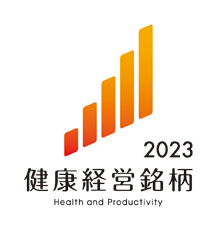

Note: The term “KENKO Investment for Health” is a registered trademark of Nonprofit Organization Kenkokeiei.